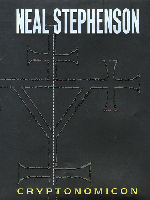| Neal
Stephenson Neal Stephenson's background shows clearly in his writing. He was born in Fort Meade, home of the National Security Agency (NSA), and grew up in a family that included biochemistry, physics, and electrical engineering professors. His own studies included physics and geography. Stephenson is the author of Zodiac, Snow Crash, and the Hugo award-winning The Diamond Age. He also writes with his uncle J. Frederick George under the pseudonym Stephen Bury. Stephenson currently lives in the Seattle area with his family. |
| Cryptonomicon
Neal Stephenson Fortunately, my forgiveness was far from required. Cryptonomicon
is the best book Stephenson has ever written. It's easily the best
book I've read this year -- probably the best I've read this decade.
Cryptonomicon alternates between the 40s, where the infant
science of cryptography is winning World War II for the allies, and
the 90s, where an eclectic group of businessmen, hackers, and
thieves are using the same science to create an Internet data haven.
That's the Cliff Notes version, of course -- even the simplest of
Stephenson's plots defies description.
The 40s storyline mostly revolves around Bobby Shaftoe and
Lawrence Waterhouse. Shaftoe is a bad-ass marine who has developed a
taste for haiku and sushi, perhaps inappropriate considering that
he's "killed more nips than seismic activity." Waterhouse
is everything Shaftoe isn't -- a cryptography savant, a true geek
who learned mathematics by disassembling a church organ, and who
thinks of his own sex life in terms of quadratic equations. The two
of them are part of a top-top-top secret counter-counterintelligence
unit whose purpose only Waterhouse truly understands. All Shaftoe
knows is that he gets the messy jobs.
In the present day, we're treated to Waterhouse's grandson Randy.
He's just as brilliant, if considerably less focused than his
forebear. Most of the time he's pretty much just trying to get laid,
but he somehow manages to fall into the world-saving business
despite himself. He's part of a loose group of Secret Admirers --
cryptography experts who want to use their skills to make the world
A Better Place through surveillance-proof communications and,
particularly, a totally anonymous and secure electronic economy.
Stephenson's prose is fast, intricate, and involving. His plots
are unbelievably complex; a treasure hunt that could easily take up
a book in itself is just one more strand in Stephenson's web of
looping, whirling, tangled storylines. He regularly spins off and
spends way too much ink describing some weird piece of
technology or culture. The half dozen pages on how to eat a bowl of
Captain Crunch leaps to mind.
And it's all wonderful. I remember taking literature courses
where I'd turn a page in some 17th-century book, see the solid block
of unbroken text, and moan in pain. In Cryptonomicon, that's
a sign that you're in for a treat. I found myself gleefully flipping
forward to search for the next paragraph break (and searching, and
searching...), delighting in the page-long, intricately constructed
sentences. I haven't had this much fun simply reading a book in as
long as I can remember.
It's possible that there are a few people out there who will read
this book and not enjoy it. I'll grant that it gets pretty technical
at times. I seem to recall that Stephen Hawking's editor once told
him that his book sales would drop by something like thirty percent
for each formula he included. If that's true, then Stephenson is in
for a disappointing royalty cheque.
Oh, and it's loooong. Very long. And there's at least one more
book to follow. I get the impression that Stephenson would have made
Cryptonomicon even longer if he could -- the ending seems
tacked on, as if he had to cut it short to be marketable.
But the real reason I was disappointed in the ending was because
it was the end. If he had written another thousand pages, I wouldn't
have been satisfied -- just farther behind on sleep. Neal Stephenson
has produced a brilliant, involving, painstakingly researched and
lovingly constructed novel that I'll be re-reading more than once. I
don't know how I ever doubted him. |
 I'm
a big fan of Neal Stephenson; I've read all of his novels, most of
them more than once. So despite the fact that I jumped at the chance
to review Cryptonomicon, his latest and most ambitious book
by far, I was perhaps just a bit apprehensive. Could I write a fair
piece, or would I go easy on him because I'm such a fan? I can
forgive much of the man who gave the world Zodiac.
I'm
a big fan of Neal Stephenson; I've read all of his novels, most of
them more than once. So despite the fact that I jumped at the chance
to review Cryptonomicon, his latest and most ambitious book
by far, I was perhaps just a bit apprehensive. Could I write a fair
piece, or would I go easy on him because I'm such a fan? I can
forgive much of the man who gave the world Zodiac.